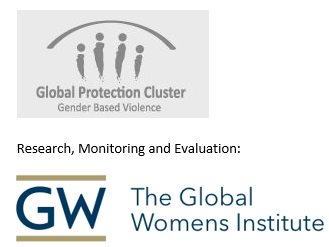- In the early stages of an emergency SOPs should be developed as quickly as possible so that basic survivor services and essential prevention (e.g. protection) activities are put into place rapidly. However, it may not be possible to develop the entire SOPs document according to the IASC template quickly enough to meet immediate needs in the crisis phase of an emergency.
- Some sections in the IASC SOPs template require negotiation and discussion, which may not be possible or appropriate in the early stages of an emergency. Moreover, the full complement of actors to launch a truly multi-sectoral response may not be in place. In this case, ‘preliminary’ SOPs should be established.
- The preliminary SOPs should cover the most relevant and urgent sections of the SOPs template. These should be developed, at minimum, by the health, psychosocial, security and legal/justice actors who will be implementing the procedures. Women and girls in the community must be consulted during this process, including women and girls who are often marginalized such as those with disabilities, lesbian/bisexual/transgender women, and ethnic/religious minorities. Other community members should also be involved as much as possible. Over time, the SOPs can be expanded and revised as more actors enter the settings and more services become available.
- Developing SOPs can be a very public process. In settings where VAWG issues are not politicized and there is support for VAWG programming, this exposure is one of the key benefits of drafting SOPs. However, in settings where VAWG issues are highly politicized and there may be security risks in publicly discussing and developing VAWG services, GBV Coordinators and GBV coordination partners should proceed with extreme caution.
- In these cases, it may be most effective in the earliest stages of an emergency to develop an abbreviated referral protocol for survivors and distribute it only to those who fully understand the VAWG guiding principles associated with working with survivors. When and if the situation improves—or when more partners are identified through a safe network of service providers—more comprehensive SOPs may be developed.
Example: Liberia has a national SOP that was drafted to guide the development of SOPs at the county level. The process was consultative, with different ministries leading sector discussions (e.g., the Ministry of Justice and Police led the Legal and Protection Sector; the Ministry of Health and Social Welfare led the Health Sector; and the Ministry of Gender and Development led the Coordination Sector). The same collaborative process is being adopted to develop and roll out the county-level SOPs.
Source: excerpted from Ward, 2010, p. 68.
Example SOPs:
Standard Operating Procedures for Prevention of and Response to SGBV (Kakuma Refugee Camp, Kenya). Available in English.
Standard Operating Procedures for Prevention of and Response to SGBV (Nairobi, Kenya). Available in English.
Standard Operating Procedures for Response to Gender-based Violence and Child Protection in Somalia (Template to be tailored to region). Available in English.
National Guidelines for Standard Operating Procedures (SOPs) for Prevention of and Response to Gender-based Violence (Pakistan). Available in English.
Additional Tools
The GBV Standard Operating Procedures Guide (SOP Guide) was published by the IASC Sub-Working Group on Gender and Humanitarian Action in 2008. The guide includes detailed guidance on the process of developing referral systems and other procedures for GBV prevention and response in humanitarian emergency settings. The guide emphasizes the importance of a collaborative and participatory process for developing the procedures and agreements contained in a SOP document. Available in English.
The GBV SOP Workshop Package was developed by the Gender-based Violence Area of Responsibility Global Working Group (GBV AOR) in the Global Protection Cluster. Development of these materials was a collaborative process jointly led by UNHCR’s Community Development, Gender Equality and Children Section and UNFPA’s Humanitarian Response Branch. The SOP Guide and workshop package can be downloaded in English.
For guidance on the roll-out of SOP’s, specific to Southern Sudan, see ARC. 2011. Facilitators Guidance on State Roll-out of GBV SOPs in Southern Sudan.
